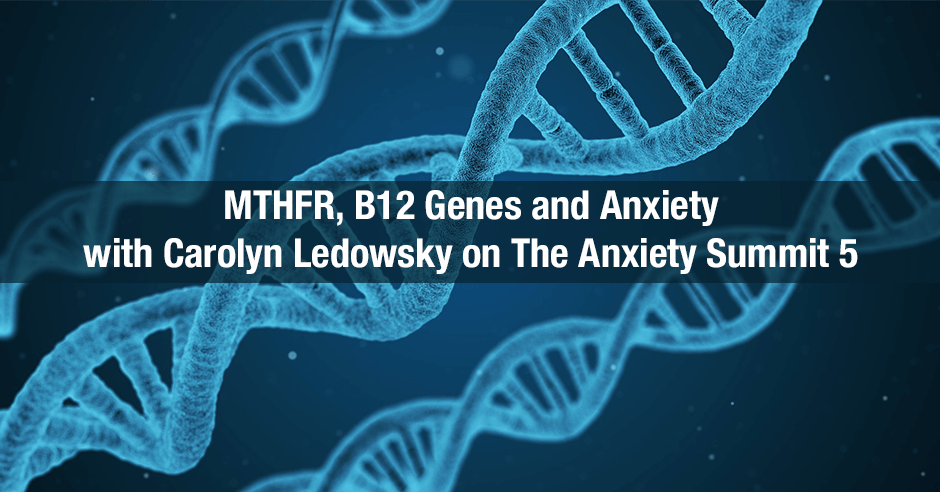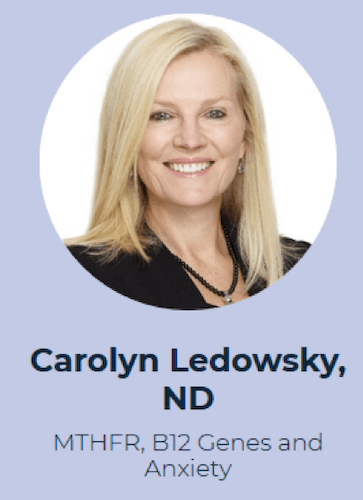
Carolyn Ledowsky, ND is one my guest experts on The Anxiety Summit 5: Gut-Brain Axis and our topic is: MTHFR, B12 Genes and Anxiety. In this interview you’ll learn:
- The mechanisms of methylation
- B12 gene variants: MTR, MTRR, TCN
- The tryptophan “steal” and a simple niacin test
- and a whole lot more!
It’s an in-depth interview that really gets into the science and mechanisms, and we start with why methylation is so important:
We need methylation to create one of the most important brain substances – phosphatidyl choline – because our brain lives on it. This is incredibly important for neurotransmitter function.
And unfortunately, this whole methylation process is not only affected by our genes but it’s hugely affected by our environment. Stress is probably one of the one of the biggest things that chews up our methyl groups.
We also talk about what the research is showing and discuss a 2018 paper titled Methylenetetrahydrofolate reductase and psychiatric diseases:
Increasing evidence demonstrates that MTHFR polymorphism including C677T and A1298C is associated with psychiatric diseases. The MTHFR gene polymorphism is linked to onset, clinical symptoms, prevalence as well as response to treatments.
If you have a MTHFR polymorphism and it’s expressing it’s very likely contributing to neurotransmitter imbalances and playing a role in both anxiety and depression. Methylation is also important for detox and fertility, and often plays a role in ADHD, bipolar, schizophrenia and autism.
Carolyn covers SAMe, folate and the importance of addressing low B12 first and how this ties back to the gut, low HCl (hydrochloric acid) and nutrient absorption. We cover B12 genes (MTR, MTRR, TCN) in detail, B12 testing, ideal forms of B12 supplementation based on your SNPs and more.
The connections she has found with pyroluria, oxalates, the CBS gene, glutathione, vitamin B6 and lysine is just fascinating and I look forward to really digging into the research and mechanisms in the future. This was not on our planned outline of topics to discuss but we went with it anyway and I’m so glad we did.
We end with a discussion on the tryptophan steal and niacin, and agree to differ on our use of tryptophan – she prefers 5-HTP while I typically start with tryptophan and then have my clients switch to a trial of 5-HTP if the tryptophan is not helping.
Carolyn Ledowsky is the founder of MTHFR Support Australia. She is a naturopath, herbalist and nutritionist and based on what I learned in this interview and this lovely note of appreciation I received yesterday, I know you’ll really enjoy it:
I had to write to you to to thank you for your work. I’ve bought your book and followed you for a while, but that interview with Carolyn Ledowsky was probably one of the most eye opening talks I’ve ever listened to! The way she explained all the difficulties with the MTHFR gene was a wealth of information, and you both worked together so well to really make things clear. I feel I have hope, and better understand what the problem is. Thank you again.
Getting feedback like this makes my day because we’re sharing great information and offering hope! May this inspire you to tune in and learn too.
You can listen to the entire interview by purchasing The Anxiety Summit 5: Gut-Brain Axis.
If you’d like to give feedback or ask a question, please post in the comments section. I’d love to hear from you once you’ve listened in.


Hi, I just got a collagen supplement. Tried it today. It says on the can can more restful sleep. It’s by great lakes gelatin co. Does this mean no bone broth either? I have one of each of the mthfr gene mutaion. Makes me a compound heterozygous. Will you send me an answer to my email. Sometimes I don’t know how to see where message like I sent you will go, on a blog???THANKS!!!
Diane
Collagen does can help with sleep but can also cause increased anxiety and worse sleep in others often due to it’s effects on serotonin levels. I cover this in great depth on my interview on the summit and in this blog https://www.everywomanover29.com/blog/collagen-gelatin-lower-serotonin-increase-anxiety-depression/
Keep in mind that having the gene mutation doesn’t mean it’s expressing and causing issues
If you checked the box “Notify me when new comments are added.” you’ll get an email when I respond and when others respond.
Enjoy the rest of the summit!
I too am compound heterozygous. May I ask what supplements are most helping you
Hi, I have found the probiotic oxalobacter fermigenes sold in India. Now this a probiotic that could help thousands with their high oxalate issues. But I am not sure about the legitimacy of the company. I have not had any success with communication or payment. However there is a business application page and thought maybe Trudy might like to see if a business account could be set up for her, they may be more prepared to deal with a practitioner. https://www.netforhealth.com/product/oxalobact-capsule-10-capsules-fourrts-india/
Denise
I am not familiar with this company. I would be very wary buying a product like this from a company that doesn’t respond to queries and until they have been vetted.
I’ll check with Carolyn to see if she has a product she recommends. In the interview with Dr. Michael Murray (our topic is “PQQ for Stress, Sleep, Mitochondria and Gut Health”) I ask about PQQ and oxalates and he shares Nephure for breaking down oxalates.
Thank you Trudy, I mentioned the oxalate probiotic to Susan Owens and her comment she doubted there were be any live probiotics. Also despite many attempts no one has had success in developing a probiotic because it seems oxalobactor f. needs other microbes to degrade the oxalates.
Denise
So Susan shared this about oxalobactor formigenes?…. “she doubted there were be any live probiotics. Also despite many attempts no one has had success in developing a probiotic because it seems oxalobactor f. needs other microbes to degrade the oxalates.” My understanding that is has been available in lab settings because it has been studied
The Nephure I mentioned contains decarboxylase enzyme and Susan is also not sure this works either. I have a box and tried some for the first time the other day after eating eggplant and so far so good. I will try it again a few times over the few months but am not thrilled about the fact it contains maltodextrin from corn (likely GMO) and is processed in a facility that also processes wheat. I’m more concerned about the wheat for my trial but it seems to be have been ok. I plan to go slow and I have to time it around work projects as I can’t afford to get a reaction and set-back in my health.
Trudy,
I have oxalate issues, both exogenous and endogenous. After watching this video with you and Carolyn, I’m so excited to find practitioners who know about this! I’ve been on a low oxalate diet for 1.5 years and have found a lot of assistance from Susan Owens’s Facebook group “Trying Low Oxalates”. However I am at the point where I need a practitioner who knows about oxalate, especially dealing with endogenous oxalate production. From your website, it looks like you can’t take new patients at the moment, so I’m wondering if you know other practitioners who know about us oxalate people?
Thanks!
Amy
So glad you enjoyed our interview – I found it enlightening too. I would suggest contacting Carolyn and will reach out to my community to get some other possible practitioners.
I have oxalate issues myself and I am convinced there has to be root causes we are missing. I’m very happy that I can control my symptoms with diet and nutrients but I’m not ready to accept that it’s a lifelong “condition”. I’m aware Susan Owen’s believes differently. I’m actively seeking solutions and one of my theories is the possible effect of glyphosate on the kidneys. We know mold and candida are issues. I also wonder about Lyme disease and heavy metals. I’ll be digging deeper into some of Carolyn’s findings too.
Thank you so much, Trudy! I will contact Carolyn and see if she has any advice about practitioners.
I agree with you that it is so nice that we can control our symptoms with a low oxalate diet and supplements. However, my problem recently has been that my symptoms are starting to creep back in, despite a strict low oxalate diet (using Susan’s spreadsheet) and a boatload of supplements. This is my reason for seeking out a practitioner who knows about this stuff. I’m afraid I might be missing certain cofactors, maybe not taking enough of something or taking too much of something (like Carolyn suggested with B6), or any combination of things that is reversing my progress. Thanks again for your response, and for your dedication to health and wellness! I’m very excited for the summit.